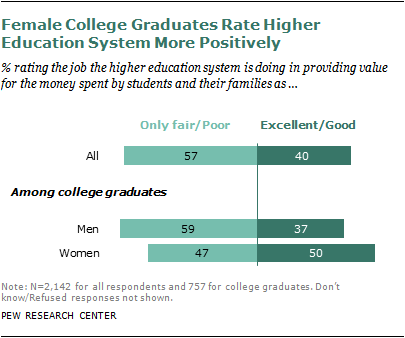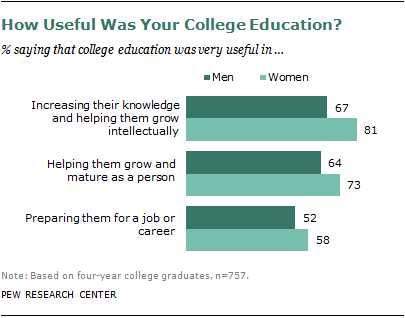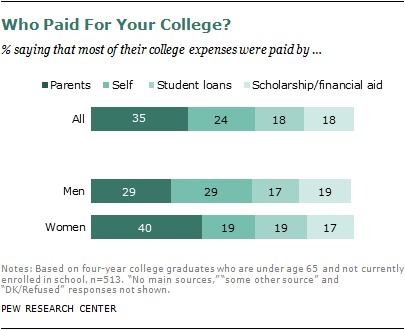
Overall, a majority of Americans (57%) give the higher education system negative ratings for the job it is doing providing value for the money spent by students and their families. Only 40% of all adults say the higher education system is doing an excellent or good job in this regard. However, college-educated women have a more positive view of higher education. Among women who have at least a four-year college degree, 50% say that the nation’s higher education system is doing an excellent or good job in providing value for the money, a view shared by only 37% of their male counterparts. Fewer than half of female college graduates (47%) say the system is doing only a fair or a poor job, compared with 59% of male college graduates.

In addition to giving more positive ratings to the higher education system, women who have graduated from college are more likely than their male peers to say their education was useful. Specifically, more than eight-in-ten women (81%) with a four-year college degree say that their college education was “very useful” in increasing their knowledge and helping them to grow intellectually, a view shared by 67% of men. College-educated women are also more likely than their male counterparts to say that their college education helped them grow and mature as a person (73% vs.64%). In terms of how useful college was in preparing them for a job or career, both men and women are somewhat less enthusiastic: 58% of women and 52% of men say college was very useful in this regard. Here the gender difference is not statistically significant.
While women see a greater value and usefulness in higher education, they may also be more concerned about the rising cost. College costs have been on the rise for several decades, and only one-in-five Americans (22%) now believe that college is affordable for most people (75% say college is no longer affordable). Among college graduates, women are less likely than men to agree that most people can afford to pay for college (14% vs. 26%).
When asked how they paid for their college education, more than one-third of four-year college graduates (35%) say that their parents paid for most of their college expenses, roughly a quarter (24%) say that they paid for college themselves, 18% relied on student loans, and the same share relied on scholarships or financial aid.

Women are more likely than men to say their parents paid most of the cost. Among women with at least a bachelor’s degree, 40% say their parents paid for most of their undergraduate college expenses, and about half as many (19%) say they paid for college themselves. Men are less likely to say they relied on their parents to finance their college education: 29% say their parents paid most of their expenses, while an equal proportion say they paid most of the costs themselves.




